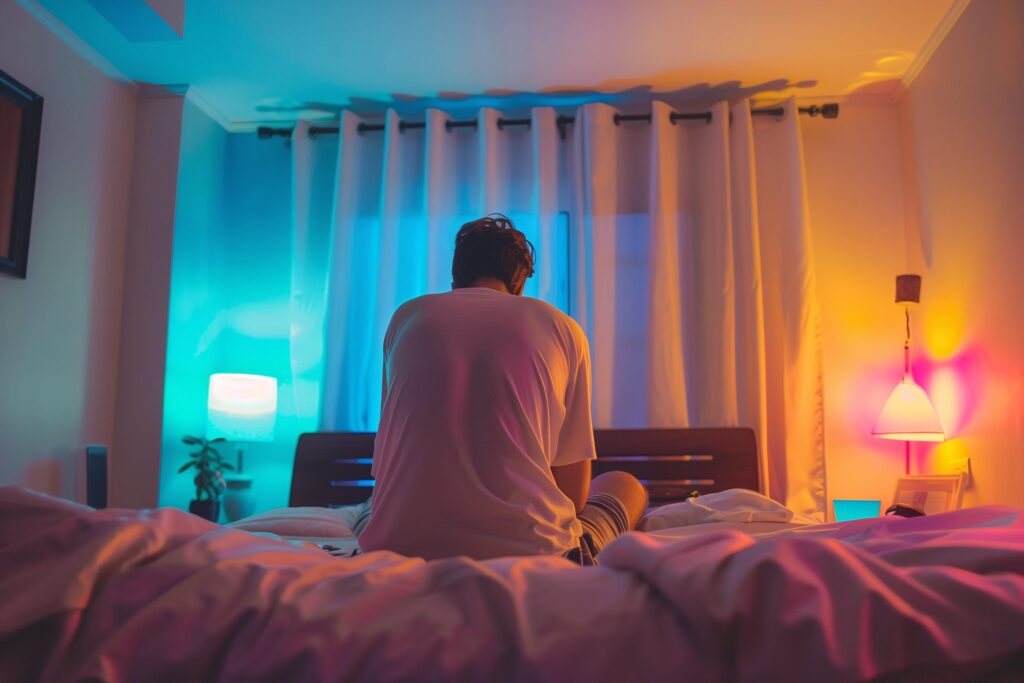
The Science of Sleep and Music: How Melodies Enhance Rest
Music can help you sleep better and fall asleep faster. It’s especially helpful for those who suffer from anxiety-related insomnia and pregnant women.

About 1 in 4 Americans have insomnia, a disorder that disrupts sleep. A good night’s sleep is vital to our health. Poor sleep has been linked to depression, heart disease, obesity, diabetes, erectile dysfunction, and a multitude of other conditions.
If you suffer from insomnia, you might want to consider a simple and free approach — music.
Can music be the answer to a better night’s sleep? Scientists suggest that it can. Research has found that listening to music is a safe and low-cost way to treat insomnia. Studies suggest that it may be just as effective as a sleeping pill.
Here’s what we know.
Music and Sleep: The Science
In one research study, published in The Carlet Report, participants who listened to music before bed had improved overall sleep quality, a reduction in insomnia, and fell asleep faster. Music had a comparable effect as prescription sleep medications.
In another study, students (ages 19-28) who had trouble sleeping listened to classical music 45 minutes before bed for three weeks. They were compared to a control group of students who listened to audiobooks before bed. The participants who listened to music had significantly improved sleep. They also had a reduction in depressive symptoms. Sleep quality did not improve in the audiobook group. Neither did depressive symptoms.
A systematic review published in the journal Sleep Health found that listening to soft music 30 minutes before bed helped improve the sleep of hospitalized patients. There were no adverse effects reported in the study. Thus, music may be a safe and low cost way to help those hospitalized get better sleep.
Music has been shown to help pregnant women sleep better, as well. One study found that expectant mothers who listened to music before bed for two weeks had significant improvements in sleep quality, anxiety, and stress. This is important because it offers a safe way for pregnant mothers to manage sleep problems without the use of prescription sleeping medicines, which may not be safe during pregnancy.
How Does Music Help You Sleep?
Listening to music has been shown to produce strong positive emotions and reduce stress. When you listen to music, it lowers the production of the “stress” hormone cortisol. This can help you relax and fall asleep easier.
Listening to music reduces pain, anxiety, and stress. It’s especially helpful for people who suffer from anxiety that interferes with sleep. That’s because it distracts you from internal worrying thoughts that can interfere with sleep. Music can put you in a more relaxed frame of mind that is conducive to sleep.
Music also triggers changes in the body that mimic sleep. It lowers your blood pressure, breathing rate, and heart rate, all of which happen naturally during sleep. So, when these changes occur, it can produce a sense of relaxation and help you drift off to sleep.
What Kinds Of Music Are Helpful For Sleep?
The genres of music that help people fall asleep vary widely. Researchers, whose findings were published in PLOS ONE, analyzed 986 sleep-related playlists to determine what music people used to fall asleep. All of the playlists had more than 100 followers. Most of the tracks consisted of ambient music. However, some playlists included pop and rap music. This was surprising because it shows that people can fall asleep to a wide variety of music, including more energetic tracks.
Researchers hypothesized that familiarity with the music is what helped people sleep, even if the music was more energetic or upbeat. The predictability of the tune led to a sense of calm, which enabled sleep.
Tips for Using Music To Help You Sleep
Does listening to music before bed sound like a good way to doze off? Music can signal to your brain that it’s time to go to sleep when you play it every night. Here’s how to implement it in your bedtime routine.
- Create a sleep playlist - Come up with a playlist that is approximately 45-60 minutes long. You can also find curated sleep playlists on all the popular streaming music platforms. Put it on about an hour before bedtime.
- Use a timer - That automatically shuts off the music when you go to sleep. iPhones have this built into the Clock app. It’s under “Timer.” Click “When Timer Ends” then hit “Stop Playing (it’s at the very bottom).” This feature works with most popular music apps.
- Follow general practices for good sleep hygiene - While music can help you fall asleep quicker, you’ll still want to practice good sleep hygiene for the best possible sleep. This includes drinking caffeine only before noon, keeping the same sleep schedule every day, sleeping in a cool, dark room, and aiming for seven to nine hours of sleep a night. You can track and analyze your sleep using Pillow.
- Find music that you personally find soothing - Everyone is different when it comes to music and what is relaxing. It may be best to choose songs that have a smooth sound and a lower pitch. Calming instrumentals are also great for sleep. But, ultimately, choose tracks that you find soothing.
- Consistency is key - Listen to the same music, at the same time, every day.
- Give it 3 or 4 weeks - It takes a couple of weeks for music to have an effect on your sleep. So, don’t get discouraged if you don’t see results right away.
- Keep the volume low but audible - Approximately 45–50 dB is ideal. This is about as loud as a rainfall.
- Avoid headphones - Using an external speaker to listen to music before bed is ideal if possible. But, you may not have that luxury if your partner prefers silence. In that case, choose headphones that you can also wear to bed in case you forget to take them off before you fall asleep.
Listening to Music At Night Isn’t For Everyone
Music isn’t right for everyone. For some people, it just doesn’t help. Some people find it too distracting for sleep. You could try listening to other relaxing sleep sounds before bed instead. Pillow has a great collection of sleep stories and meditations that may work better for you than music.
FAQ
How does music compare to white noise or nature sounds for sleep?
Music, white noise, and nature sounds can all promote relaxation and sleep, but they work differently. Music engages emotions and familiarity, making it a soothing tool for many. White noise, on the other hand, provides a consistent sound that masks external noises, making it ideal for light sleepers. Nature sounds, like rain or ocean waves, can create a calming atmosphere similar to music but without melodic distraction.
Can listening to music replace traditional sleep aids?
Music has been found to be as effective as some prescription sleep medications for improving sleep quality. However, its effectiveness varies from person to person. While it can be a great alternative for those looking to avoid medication, people with chronic insomnia or severe sleep disorders may still require professional treatment.
Are there any potential downsides to using music for sleep?
For some people, music can be too stimulating or distracting, making it harder to fall asleep. Others may find headphones uncomfortable or worry about potential hearing issues from prolonged use. In these cases, alternatives like sleep stories, meditation, or nature sounds might be a better fit.
Can music help with other sleep-related issues, such as nightmares or sleep apnea?
Music may help reduce nightmares by lowering stress and promoting a more relaxed state before bed. However, for conditions like sleep apnea, it does not address the root cause. Those with sleep apnea should seek medical advice for proper treatment, though relaxation techniques—including music—can complement a treatment plan.
How long before bedtime should I start listening to music?
Research suggests that listening to music for about 30-60 minutes before bed is ideal for promoting relaxation. Starting too late might not allow enough time to fully unwind, while playing it too early may reduce its effectiveness as a sleep cue.

Written by
Emily Mendez
Emily Mendez is a former therapist and mental health author. She is one of the leading voices in mental health. Emily's writing has appeared in eCounseling, SonderMind, and more. Emily is frequently interviewed by Healthline, Fatherly, INSIDER, Family Circle, and other national media for her advice and expert opinion on the latest mental health topics.
Download Pillow
Get help
Press & News
Legal
Connect
X (Twitter)
Company
Copyright © Neybox Digital Ltd.



